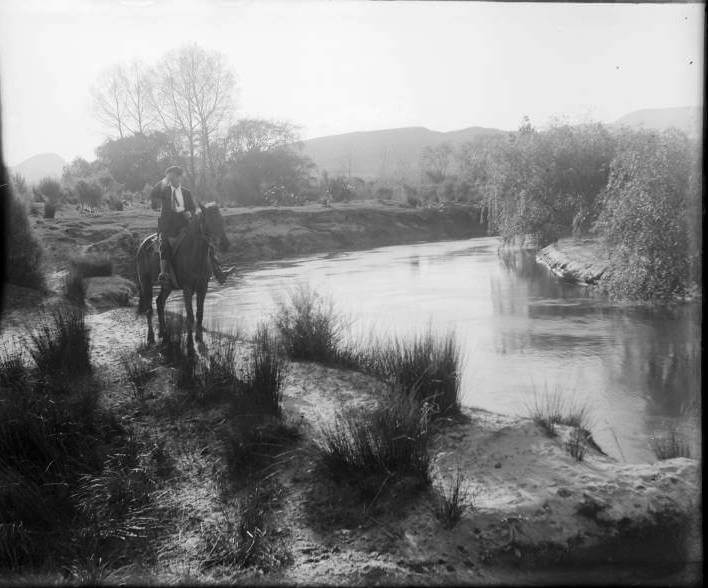Every bend, every nook and every corner of the Puniu River as well as numerous snags were searched by Constables Gillies and Rudd and several settlers in the hunt for 23-year-old George Savage. He had disappeared on a Sunday in early November 1882 but after several days no trace of him could be found.
George, an Englishman from Cheshire, was a farm labourer employed by Mr Tole of Ōrākau. He had started on horseback for a Māori settlement some 15 miles distant where he was going to make enquiries about a horse that he had sold to John Davis. Davis had been sent to gaol for a month; concerned for the horse, George wanted to retrieve it.

Man, horseback, river
John Curley, also a labourer on Tole’s farm, advised him not to go, as there had been heavy rain the night before. He knew that George would have to cross the Puniu River which could rise several feet very suddenly. When George didn’t return by Monday evening, Mr Tole became alarmed and informed the Te Awamutu police. Constables Gillies and Rudd at once proceeded to the settlement where they learned that George had arrived, leaving for Ōrākau about 6pm. That same evening John Curley went to the Puniu River which was running high. He found George’s horse and saddle but no bridle. The horse had evidently been in the water as the lining of the saddle was wet. It was surmised that George had crossed the swollen river and been swept from his horse and drowned.
But then events threw a veil of mystery over George’s disappearance, giving rise to a suspicion that he had met his death by foul means. A man named Maniapoto, while in Corboy’s Hotel, Kihikihi told a boy, Benjamin Ward, that another man, Pukekura, had tomahawked George and thrown him into the Punui River. Benjamin at once informed two men what Maniapoto had said, and the story soon reached the ears of Constable Gillies. Maniapoto denied having made the statement. Benjamin however, stuck to his story. Because Benjamin mentioned the matter to two men immediately after being seen in conversation with Maniapoto, the story had an air of probability and the police were inclined to give it credence.
Much surprise was felt when ugly rumours ran through the district that George had been murdered. Maniapoto was reported to have been intoxicated when he made the accusation and the feeling was that his statement was not reliable. However, from the hurried movements of the police, reported the watchful Kihikihi correspondent to the Waikato Times, it was quite obvious they were in possession of certain facts.
Pukekura was nowhere to be found but George was, around ten days after his disappearance, by Rangi Tuatea, in the Puniu River opposite Martin’s property. At the inquest Dr Blunden stated he believed George had drowned. Piripi Pungarehu, of Tokanui, gave evidence as to the movements of several local residents that day, but he hadn’t seen Pukekura. Constable Gillies said he could find no marks of violence on George.
There were two shillings and two pence in his pocket, a memorandum book, pipe, matchbox, and some tobacco. The jury found that George had drowned, removing painful suspicions of foul play. George was probably buried at Kihikihi and is also included in the inscription on a family headstone at Helsby, Cheshire.








